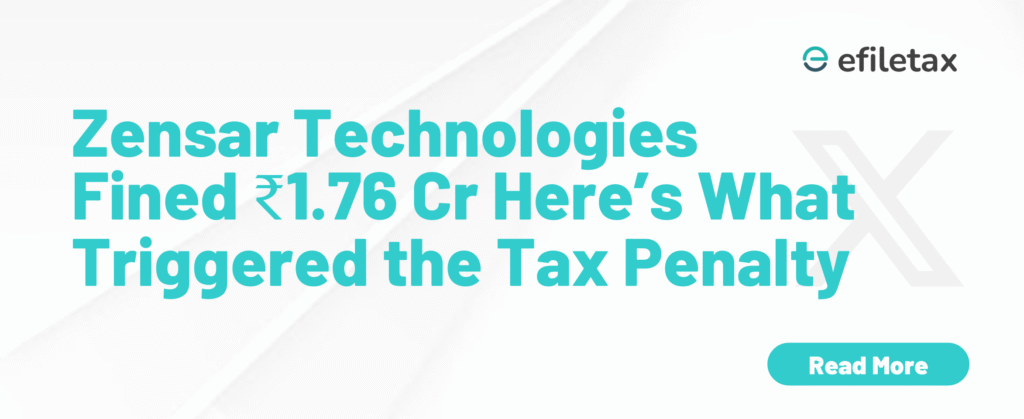
Zensar Technologies Hit with ₹1.76 Cr Tax Penalty: What You Should Know
Zensar Technologies, a leading Indian IT services firm, has been slapped with an income tax penalty of ₹1.76 crore. The penalty order was issued by the Income Tax Department under Section 270A of the Income-tax Act, 1961, citing under-reporting of income.
Let’s break down what this means for Indian corporates and why this case is significant.
Why Was the Tax Penalty Imposed?
The penalty was related to Assessment Year 2021–22, with the tax authorities alleging that Zensar under-reported its taxable income.
As per the tax department:
- The returned income was ₹117.5 crore
- The assessed income stood at ₹128.6 crore
- The difference of ₹11.1 crore led to a tax penalty under Section 270A
This penalty section, introduced by the Finance Act, 2016, deals with misreporting and under-reporting of income and can attract a penalty ranging from 50% to 200% of the tax avoided.
Section 270A Explained
Here’s how Section 270A works:
| Type of Default | Penalty Rate |
|---|---|
| Under-reporting of income | 50% of tax payable |
| Misreporting of income | 200% of tax payable |
Legal Basis for Penalty
The penalty was issued via a formal order under:
- Section 270A of the Income Tax Act, 1961
- Rule 12 and Rule 14 of the Income-tax Rules
- Based on audit scrutiny and reassessment findings
Zensar has the right to challenge this penalty before the Commissioner (Appeals) or Income Tax Appellate Tribunal (ITAT) under Chapter XX of the Act.
Expert Tip: How Can Companies Avoid This?
🔎 Keep documentation airtight.
According to CA experts, most under-reporting disputes arise due to:
- Mismatches in financial reporting and tax filings
- Inadequate disclosures in tax audit reports
- Aggressive deductions or claims without full backing
Tip: Always reconcile books of accounts with tax computations and maintain working papers for every material adjustment.
Impact on IT and Listed Firms
This case sends a strong signal to publicly listed and tech-driven firms that:
- The Income Tax Department is closely reviewing transfer pricing and deduction claims
- Disclosures in ITR and Form 3CD must match internal audit trails
- Any inconsistencies can lead to financial penalties and reputational risk
Summary Snippet (For Google):
Zensar Technologies received a ₹1.76 crore tax penalty under Section 270A for under-reporting income. Learn what triggered it and what IT firms must do to stay compliant.
FAQs
Q1. What is Section 270A in income tax?
Section 270A penalizes under-reporting or misreporting of income.
Q2. Can the Zensar penalty be appealed?
Yes, they can appeal under Sections 246A or approach ITAT.
Q3. Does this affect Zensar’s financials?
While minor in quantum, it may impact disclosures and investor sentiment.
Final Word
The Zensar tax penalty is a wake-up call for all tax-compliant Indian businesses, especially in the IT and services sector. Transparency, audit readiness, and proper documentation are no longer optional — they’re essential.